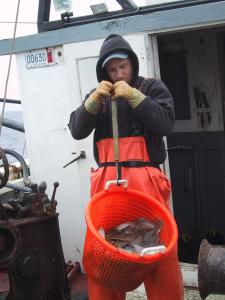Karl Cygler

Sector Management in New England
This project documents fishery management related changes in individuals, households, and communities in New England.
Matthew Schult
Karl Cygler, 36, owns a company which provides fisheries observers to commercial fishing vessels, including sector and commonpool boats. Mr. Cygler used to be an observer as well and his father was a commercial fisherman in the 1980?s. Mr.Cygler has seen changes in observer coverage since sectors started and his staff mentioned there is more tension and frustration on the part of the fishing industry in having to carry observers at a higher rate than before sectors. Mr. Cygler mentioned the fishing industry now seems to have more investment in the data collected by observers, as now this data can be used to close fisheries if high numbers of certain ?choke? species are caught. While the industry has changed due to sectors and he sees a high turn-over rate in his observers due to the difficult nature of working at sea, he says he has great hopes for the future of the groundfishery in New England. Mr. Cygler hopes that sectors will continue to function in a more positive way for fishermen in New England.
Please Note: The oral histories in this collection are protected by copyright and have been created for educational, research and personal use as described by the Fair Use Doctrine in the U.S. Copyright law. Please reach out Voices@noaa.gov to let us know how these interviews are being used in your research, project, exhibit, etc. The Voices staff can help provide other useful resources related to your inquiry.
The NOAA mission is to understand and predict changes in climate, weather, oceans, and coasts, to share that knowledge and information with others, and to conserve and manage coastal and marine ecosystems and resources. The Voices Oral History Archives offers public access to a wide range of accounts, including historical materials that are products of their particular times, and may contain offensive language or negative stereotypes.
Voices Oral History Archives does not verify the accuracy of materials submitted to us. The opinions expressed in the interviews are those of the interviewee only. The interviews here have been made available to the public only after the interviewer has confirmed that they have obtained consent.
